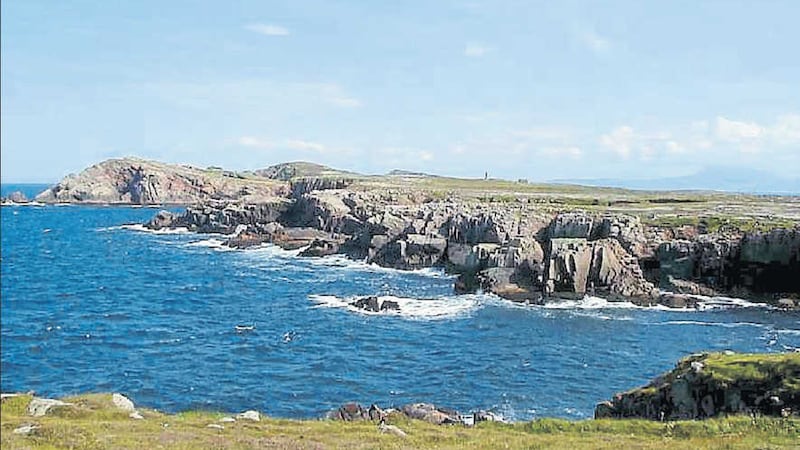I leaned alone against the wobbly steel rail marking the open-ended edge of Machaire Rabhartaigh pier. The irregular spits from a light morning shower pattered on my face.
Far across the calm crescent inlet and the dunes further beyond, a clump of dark candyfloss cloud roundly capped Muckish - whipped like an old man’s unmanageable comb-over.
Up to the left in the murky blanket of Donegal sky lay the source illuminating shards of razor lights that were cutting through the grey. Ribbons of brightness sprayed around the bay.
When you’re in touch with Machaire Rabhartaigh strand, rainbows can fall at one end of the beach while the other basks in brilliant warmth. The sunsets can stupefy with spectacular drama. Even the fog can inspire awe.
The salty, whispering mists that suddenly rise over the incoming waves can leave you wondering again about those stories the old seanchaí woman used to paint with old gaeilge words at the summer gaeltacht in Loch an Iúir. (Myths? Or legends?)
It was just before eight on a Sunday morning a couple of weeks ago. I was squeezing the senses from the last morning of a short break at one of the most mystical places I know - a place I’ve been visiting for 40 years.
The tug of the full moon meant the tide's swell was at its highest. As I pulled the fishing rod in for the last time I heard a local voice over my shoulder.
“So are you catching much?” asked the ‘local’.
“Nah, I’m just killing time,” I replied, making myself ready to politely slide off into the quiet space of a morning coffee.
But the ‘local’ kept talking. With the courteous guile of a country gent, inside a few minutes he had my name, my work, where I was staying, where I come from, and when I was going home. (Like a ‘P’-check.)
In return, I heard that he was once a fisherman, but that the drop in catches had made his business unsustainable; that the rocks down off Min Larach are a better bet for mackerel; that he’d built several houses in the last couple of decades despite not being a builder; and that the renovated pier on which we stood is a big problem locally.
This last bit drew me in. Machaire Rabhartaigh pier appears to be as strong and safe as any harbour as you’ll find. It’s home to working fishing boats, as well as the ferries to Oilean Thoraigh and Inis Bo Finne. With the new car park, the nearby café and local college, I’d always thought it expanded the scale of local transport and infrastructure without ruining the vision and viewpoint.
The ‘local’ illustrated the issue by drawing his finger in several arc shapes through the cold dew that layered the bonnet of the red transit van parked just behind us.
He explained that when the pier was redeveloped and extended about 15 years ago, it was built without any arches underneath it. And he said that was a simple but crucial issue.
The old pier used to be fairly short and straight. The expansion made it longer and turned it into an L-shape. The absence of arches underneath now causes sand to get clogged up on the inside corner of the harbour because the tide can’t flow freely under or around the pier. Yet this was the precisely problem - gathering sand - that the new design had been meant to fix.
No doubt the pier was well-built to specification, but it’s since required expensive dredging to remedy access problems. And, due to repetitive dredging, there’s even talk now of a new breakwater being made out in the beautiful bay.
We shook hands and I dandered back to the car, leaving behind a space of intense memory and meaning for me – where spiritual substance is literally tangible.
But it’s also a place which, that day, reminded me how – in life – sometimes the unbreakable strength of a mighty harbour can actually create unnecessary weakness; that we each need more openness in the underlying ebb and flow of developing our society - and the vision to sometimes let the sands shift; and that the best way to solve long-term problems is often making sure we don't create or compound them in the first place. (Sounds like a checklist for strategic diplomacy.)
As I drove away, I knew that – just like this column – I'd soon return to analysing the hard detail of pressing political problems and serious social issues. But for that morning, and for that moment, they could all just wait their turn.







